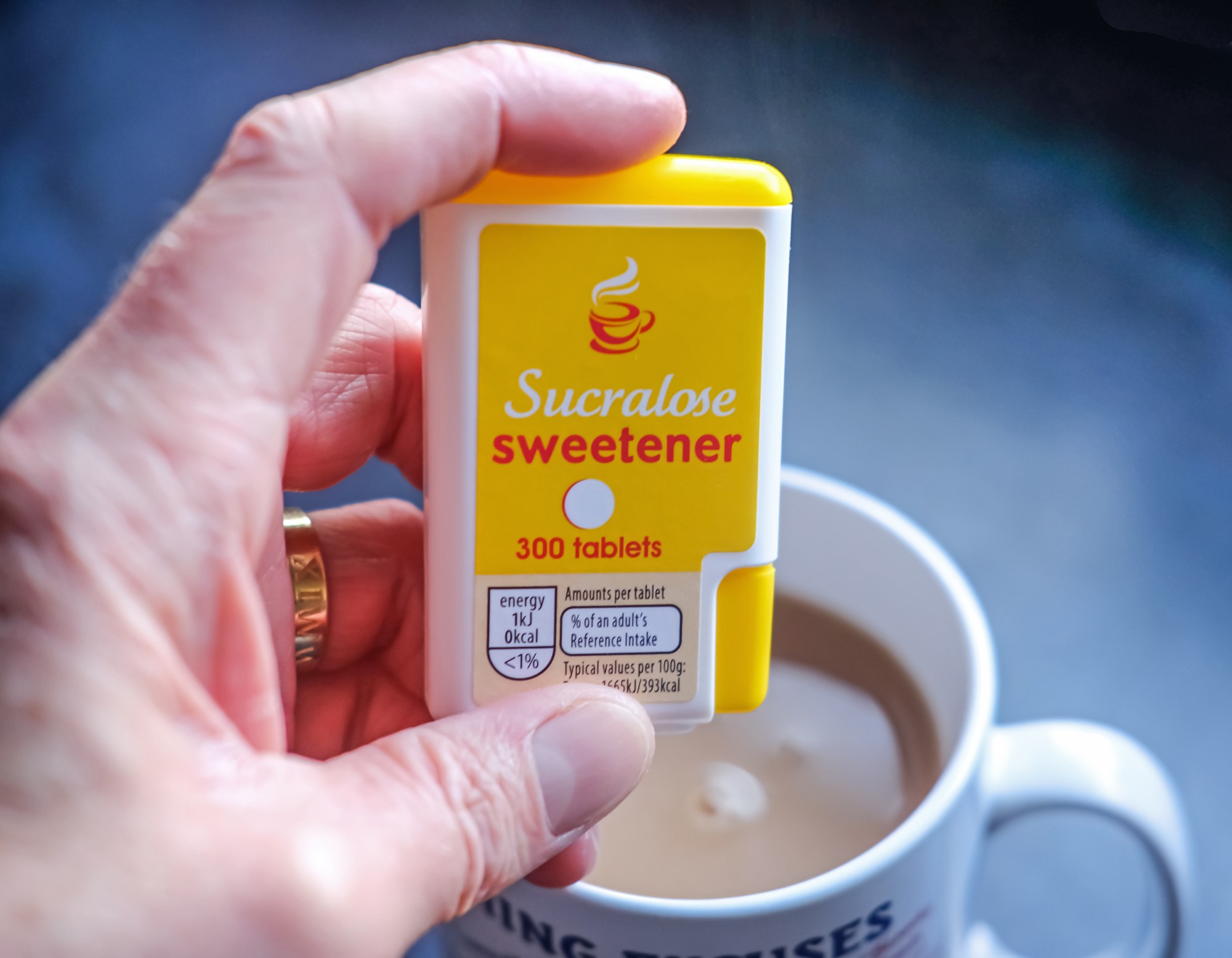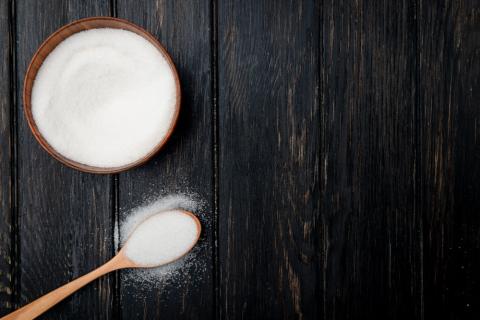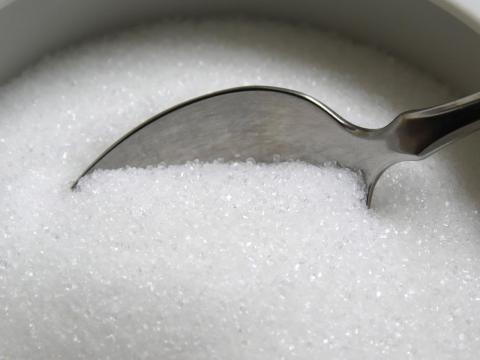Reactions: high-dose sucralose sweetener reduces immune response in mice
A study in mice has found that high doses of the sweetener sucralose can reduce the immune response and, under certain laboratory conditions, alter its action against infections or tumours. The results are published in the journal Nature.

Adobe Stock
Sucralosa - África González
África González-Fernández
Professor of Immunology at the University of Vigo, researcher at CINBIO, and member of the RAFG
The study has to be considered with great caution. I notice several elements that I think should be taken into account.
The title is misleading, as it implies that sucralose has negative effects on the T-cell immune response, when what has been studied are very high doses—much higher than those of a typical human diet.
We should keep in mind that the animals in the study did not show any alteration in their immune components, and most of the findings were in in vitro cells cultures.
On the other hand, I find that the article lacks studies of the immune response against pathogens such as viruses, for example, where the cellular immune response is essential - together with that of B lymphocytes, which differentiate into antibody-producing plasma cells. Instead, the authors have focused on tumour and autoimmunity models.
They have not determined potential mechanisms underlying this specific effect on T-cells and their cell membranes. This is an avenue worth exploring.
The novelty that this study brings is very debatable, considering that the study design uses much higher doses than those of a normal human diet, so the practical implications in terms of the human diet are very limited. Everything, absolutely everything, can be toxic in certain doses. The results obtained with such high doses show an exclusive effect on T-cells in specific animal models, with a decrease in the anti-tumoral response and a potentially beneficial effect on autoimmunity (the researchers tested a model of diabetes).
The study therefore has many limitations. On the one hand, the dose used, which is not physiological; the fact that it is an animal model (mouse); the time of administration, and the fact that the tests are in vitro.
I believe that these data should be taken with great caution and not be extrapolated directly to what might happen in humans. There are hundreds of studies carried out with this substance and, except for changes in the microbiota, it has not been shown to cause any problems for human health. It is safe, non-carcinogenic and does not affect the immune system.
Considero que estos datos deben tomarse con mucha cautela y no hacer una extrapolación directa a lo que podría ocurrir en humanos. Hay cientos de estudios llevados a cabo con este agente y, excepto cambios en la microbiota, no se ha demostrado que tenga problemas para la salud humana. Es seguro, no carcinogénico y no afecta al sistema inmunitario.
Sucralosa - Oliver Jones
Oliver Jones
Professor of Chemistry, RMIT University, Melbourne (Australia)
Artificial sweeteners seem to be getting a bit of bad press recently. Last month we heard a lot about over a possible (but unproven) association between erythritol and an increased risk of blood clotting and now we hear sucralose may affect the immune system – but does it?
Sucralose is probably the most widely used artificial sweetener worldwide, and there has some discussion about its potential effects of the bacteria living in the gut and/or how it breaks down above 120 degrees C. The data on both is limited. There is no conclusive evidence that sucralose, erythritol or any other common sweetener are anything but very safe.
The paper by Zani et al is the first I have seen looking at the possible effects of sucralose on the immune system. I think the work is detailed and interesting. It is important to stress however, that, as the authors themselves point out, the work does not show that normal sucralose consumption can affect the immune system. The effects seen in the work were minimal and only found at very high doses, well above what a person would eat in a day (or possibly several days). The study was also conducted only on mice which are not mini humans and don’t always respond to chemicals the same way we do. The number of animals used in the work is also quite low so the results should be thought of as indicative not conclusive.
In short, while this is clever work and tells an interesting biochemical story I don’t think people need be alarmed about these results.
Sucralosa - Rafael Urrialde
Rafael Urrialde de Andrés
Professor at the Faculty of Biological Sciences of the Complutense University of Madrid and at the Faculty of Pharmacy of the San Pablo-CEU University, and member of the Board of Directors of the Spanish Society of Nutrition
This is an interesting study, although it is limited by the fact that it was carried out in mice. It is essential, not only with sweeteners, but with all other additives and ingredients in food products, to carry out in vivo studies in humans, especially at the gut microbiota level, both in isolation and in combination with other ingredients or foods and beverages, which is how they are actually consumed in the food diet. This is called total diet and longitudinal studies.
In addition, such studies need to rethink the way safety and health assessment is done, to look more deeply into biological as well as toxicological data.
On the other hand, as also indicated in the study, the effects detected were not seen with either acesulfame-k or saccharin. This therefore also reinforces the fact that studies should be on a case-by-case basis and that neither positive nor negative effects can be extrapolated from one additive to another and in this case from one sweetener to another.
Furthermore, one of the possible limiting situations in relation to the threshold of the acceptable daily intake, which also depends on areas or territories - the threshold approved by EFSA is not the same as that approved by the FDA - would be the long-term effects, as it is calculated for a life of 60-70 years and the studies carried out are for a short period of time.
On the other hand, sucralose is one of the most widely used sweeteners in food products, as we found in a study published in 2021 in the journal Frontiers in Nutrition. It is present in: fruit nectars, soft drinks, sports drinks, energy drinks, coffee and tea drinks, breakfast cereals and pastries, yoghurts, fermented milks, milk drinks, cheeses, sauces and condiments, preserved fruit, sweets and chewing gum, desserts and pastries, chocolates, jams, table-top sweeteners, food supplements. According to other studies in which I have participated, such as the review carried out by a team of Spanish scientists and published in the journal Nutrients in 2022, the sweeteners that could have an effect on the gut microbiota are sucralose and saccharin.
Everything indicates that it is increasingly necessary to separate the evaluations and studies of some sweeteners from others, as well as to see and analyse each one separately and not to extrapolate conclusions in a generic way to the whole group of this type of additives, whether they are synthesis or extraction and purification of natural origin. Scientific and technical knowledge is advancing and all this means that the approval and authorisation programmes, as well as the re-evaluation of all additives and of sweeteners in particular, must be coordinated and directed by the Scientific Committees of the European Food Safety Agency in coordination with the Joint FAO/WHO Committee and with other food safety agencies, both in other European countries and, for example, in the United States, Australia, Canada, Japan, Latin American countries, etc. Above all, to clearly differentiate what are observational studies that do not imply causality from in vivo studies with animal models and those that could be carried out in humans.
Doses are possible but probably high and would be difficult to achieve in humans on a continuous daily basis. The problem is also physiological adaptation: let us not forget that it is not the same in mice as in humans. On the other hand, we have to take into account the frequency and time of exposure to consumption, as well as the administration (in this case it was water with sucralose). One of the aspects to be studied in the future will probably be to analyse the behaviour of sucralose in isolation and that produced in different food matrices, because absorption may be different, as well as the possible use of sucralose in this case by the intestinal microbiota. This was the possible effect seen with this sweetener with consequences on other physiological aspects, probably modulated by the gut flora. In the study, for example, it is clear that sucralose in mice does not affect body mass gain, insulin levels or glucose tolerance. In the case of the gut microbiota, as we report in the review published in 2022, in some cases it does and in others it does not, which means that many more studies need to be carried out to determine and assess the scientific evidence.
Desde 1986 hasta 1992 trabajé en la Facultad de Ciencias Biológicas en la Cátedra de Fisiología Vegetal como Colaborador y desarrollando el trabajo de mi tesis Doctoral. En el año 1991-1992 estuve con una estancia en el Instituto del Frío del Consejo Superior de Investigaciones Científicas como Colaborador Científico en la Unidad de Congelaciones Vegetales. Desde el año 1992 a 2000 trabajé en una Asociación de Consumidores, en la Unión de Consumidores de España y en la Revista de Consumo Ciudadano (editada por 5 asociaciones de consumidores), fui el Director de Alimentación y Salud y el Director Técnico, respectivamente. De 2000 a 2006 trabajé en Puleva siendo el Director de Seguridad Alimentaria y Salud. De 2006 a 2020 en Coca-Cola Iberia como Subdirector de Asuntos Científicos y Regulatorios y posteriormente como Director de Nutrición y Salud. Desde 2020 soy Profesor en diferentes Facultades de distintas Universidades: Facultad de Biológicas de la UCM, Facultad de Farmacia de la USP CEU, Facultad de Enfermería de la Universidad de Valladolid y colaboro en distintos másteres de alimentación biología vegetal aplicada y seguridad alimentaria de la Facultad de Veterinaria de la UCM, de la Facultades del Campus de Ciencias de la Salud de la Universidad de Barcelona, de la Facultad de Farmacia de la Universidad de Sevilla y de la Facultad de Farmacia de la Universidad de Granada. Soy miembro o socio de distintas sociedades científicas: Sociedad Española de Seguridad Alimentaria-SESAL, Sociedad Española de Nutrición Comunitaria-SENC, Academia Española de Nutrición y Dietética-AEND, Sociedad Española de Nutrición-SEÑ, Sociedad Española de Medicina del Deporte y miembro del Patronato de la Fundación Española de la Nutrición-FEN. Además, soy Académico Numerario de la Real Academia Europea de Doctores-RAED y Académico de Honor de la Academia Española de Nutrición y Dietética, Presidente del Comité Científico de la Sociedad Española de Medicina del Deporte y Vocal de la Junta Directiva de la Sociedad Española de Nutrición-SEÑ. Desde marzo de 2020 no tengo ningún conflicto de interés porque no tengo relación contractual ni de ningún tipo con ninguna empresa alimentaria, ni de la transformación ni de la distribución, ni farmacéutica. Solo he colaborado con Asociaciones de Consumidores y Sociedades Científicas o estoy como miembro de Comité Científico Asesor en algunas plataformas de información.
Sucralosa - Óscar de la Calle Martín
Óscar de la Calle-Martín
Specialist in Immunology at the Hospital de Sant Pau in Barcelona and secretary of the Spanish Society of Immunology
The study is serious and rigorous, as it should be, given that it has been published in one of the world's leading scientific journals. That the study has been thoroughly reviewed by the editorial team and peer-reviewed can be concluded by looking at the date at which it was originally submitted (2021) and at which it has been deemed acceptable for publication (2023); rarely does more than a year go by in this process. This suggests that the authors have been forced to perform multiple additional experiments, probably those in human cells, and in the animal model of diabetes.
The conclusions are well documented by a varied set of experiments in each case. The evidence from controls is also irrefutable. The immunosuppressive effect of sucralose is on T-cell function and differentiation and does not affect other elements of the immune system.
Current evidence indicates that the replacement of natural sugars (glucose and sucrose, fructose being a case apart) by artificial sweeteners (saccharin, aspartame, cyclamate) has no beneficial effect, not even in protecting against obesity, but rather the opposite. In the case of sucralose, a very potent artificial sweetener, we also found an immunosuppressive effect, which would be enough to call into question its use in human food.
The limits have been taken into account not only by the authors with multiple experiments, but also by the editors and reviewers who have forced the former to introduce new sets of experiments, as well as controls probably using human cells. The dose range used in mice probably generates levels of sucralose similar to those that can be obtained by ingesting foods containing this synthetic sweetener. Therefore, studies should be done in people who ingest large amounts of sucralose and what effect it has on their immune system. Also, the possible benefit of sucralose intake in people with autoimmune diseases should be explored. The chosen model of diabetes is not currently useful for diabetic patients.
- Artículo de investigación
- Revisado por pares
- Estudio experimental
- Animales



